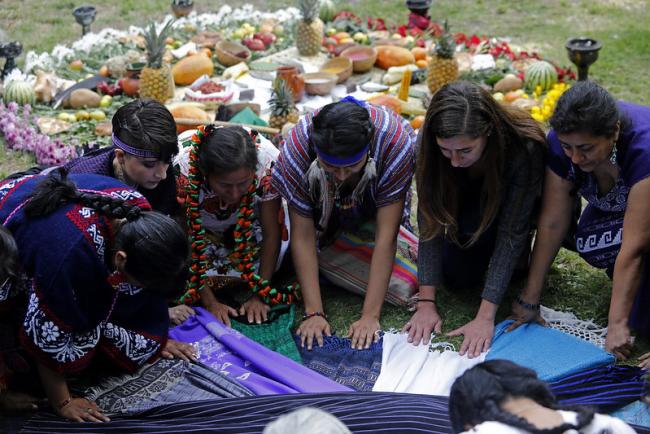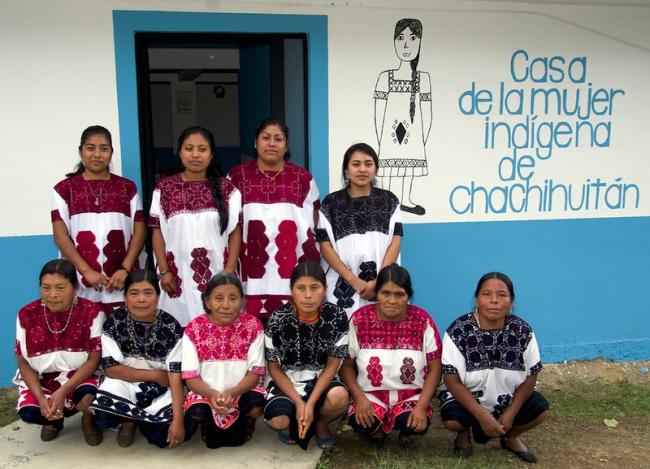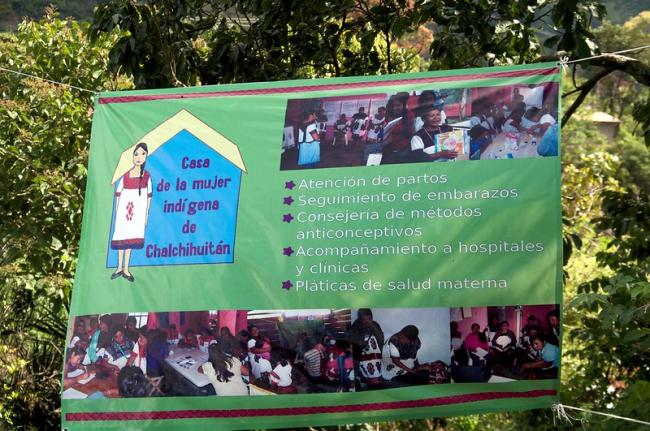
At the reproductive healthcare center Morada Violeta in Mexico City, midwives are seen as defenders of women and gender expansive people’s rights and autonomy. They offer personalized and politicized care that is rooted in a feminist approach that acknowledges the multifaceted spiritual, emotional, social, and physical dynamics of pregnancy and childbirth. “Our model is based on reflecting on how the system of oppression impacts women and their health care,” reads the center’s website. “We understand that women are diverse and we support them by adapting to their needs and decisions.”
Hannah Borboleta is a midwife and the founder of Morada Violeta. She says she started the center in order to provide a space where caretakers spend ample time treating each person’s needs with dignity as part of a greater movement toward women’s liberation. “We provide free appointments to women activists, immigration advocates, mothers seeking disappeared children, mothers of femicide victims, women who accompany abortions, and women in migration situations,” Borboleta explains.
One activist described her free, holistic gynecological appointment at Morada Violeta: “The midwives create a safe space with clear answers to your questions and respect for your decisions that helps you navigate health processes in a loving way. It was healing after experiencing obstetric violence in the traditional medical sector.”
Midwives are at the forefront of providing personalized and dignified reproductive health care. But their labor and autonomy are under threat from a proposed standard drafted by the Mexican Secretary of Health that aims to regulate maternal and neonatal healthcare nationally.

In 2022 just under 239,000 births were attended outside of a hospital across Mexico, many of which were likely attended by independent midwives. Autonomous midwives harness a blend of delivery techniques and medical training to accompany births and provide contraception and gynecological health care. Traditional midwives, operating predominantly in rural communities, draw from practices rooted in Indigenous heritage to connect communities to ancient ritual and land through pregnancy, delivery, and post-partum care.
In July, the Mexican Secretary of Health released the Proyecto de Norma Mexicana Oficial 020. The draft regulations would expand access to birthing services within the formal health care sector by establishing roles for state-certified “professional” midwives to attend low-risk births. However, for midwives operating outside of the health sector, the draft regulations could significantly restrict their practice.
While traditional midwives in Mexico recently won the right to issue birth certificates, the health standard could inhibit access to birth certificates for traditional midwives not recognized by the Secretary of Health—constituting a violation of a newborn’s right to identity. The draft prohibits autonomous midwives like those at Morada Violeta from administering medications for birth complications including hemorrhage and preeclampsia, two of the leading causes of maternal mortality in Mexico. The proposed stipulations could also result in the closure of existing autonomous midwifery spaces and force many midwives to cease practicing.
Strengthening the capacity of midwives is directly correlated with enhanced maternal health outcomes. Studies show that universal coverage of midwifery interventions could prevent two-thirds of maternal and neonatal deaths globally, saving 4.3 million lives each year by 2035. However, the regulations not only threaten the livelihoods of midwives, but also put at risk the health of hundreds of thousands of people who seek their care in Mexico each year.
The last day for public comment on the draft was September 16. Amid protests from midwifery movements, the National Center for Gender Equity and Sexual Health is reviewing the comments and feedback collected during a public consultation period. So far, it has not issued any statements on whether the draft will be modified or approved.
Combatting Obstetric Violence
Yolanda Varela Chávez, the director of the Center for Gender Equity and Reproductive Health (CNEGSR), says the impetus behind creating the standard was to expand access to quality maternal health care. Mexico’s maternal mortality rates were steadily decreasing before an increase of 60 percent during the pandemic. They have since dropped down to 24.4 maternal deaths out of 100,000 births—well under the Sustainable Development Goal of a ratio of 70 or fewer by 2030. However, high demand and limited supply of birthing services in hospitals continue to drive adverse outcomes for pregnant people.
Chávez explains that the vast majority of births in the formal health sector are attended at the secondary care level, where medics are surgically equipped to handle emergencies. Yet overwhelmed hospitals have contributed to a trend of doctors resorting to cesarean sections to expedite births. Mexico now has one of the highest rates of cesarean sections in the world, reaching 54 percent in 2023. When medically unnecessary, cesarean sections create undue risk for infection and complications. According to Mexico’s National Survey on the Dynamics of Household Relationships, 24 percent of the cesarean sections carried out last year were not authorized by the people on whom they were performed. Similarly, pregnant people report high rates of obstetric violence in the Mexican hospital system.
The CNEGSR announced the development of a standard in 2022 to expand maternal health services and prevent unnecessary surgeries. The draft standard shifts low-risk births to the primary care level, in which "professional" midwives certified through state university programs would be authorized to attend. However, for the tens of thousands of autonomous and traditional midwives trained outside of the state system, the standard severely limits their authority to practice.
The CNEGSR did not include autonomous and traditional midwives among the 26 institutions invited to create the draft standard. Midwives working independently from the state say their exclusion results in the subordination of their profession. "Since the proposal's formulation was announced, only a few midwives were summoned without [the government] revealing the selection criteria, and they were asked to sign confidentiality agreements,” reported Animal Político about the process in March.
The National Agenda for the Defense and Promotion of Traditional Midwifery also denounced the closed process in a statement: “The invitation extended by the Center for Gender Equity and Reproductive Health to certain fellow midwives in no way constitutes a prior, free, and informed consultation, which the Mexican State is obligated to carry out.”
Midwife Kay Cisneros points out that social stigmas against midwifery perpetuate their exclusion in policymaking. “When people hear ‘midwifery,’ the first thing they imagine is that it's risky; women who receive care from a midwife or who give birth at home are in danger, they could die, and their babies could die. And that is a great myth fueled by misinformation and discrimination against our work,” Cisneros told the outlet Nación 321.
Impacts of the Standard for Midwives, Pregnant People, and Newborns
For traditional midwives, the draft standard could perpetuate historical patterns of state control and repression. Traditional midwives argue that those who are not “identified” by the Secretary of Health or who abstain from joining the voluntary registry could face continued discrimination, such as the denial of birth certificates, refusal from health personnel to admit women into hospitals, and threats to cease practicing. The standard calls for the Secretary of Health to identify traditional midwives based on community recognition, without any specification on what recognition entails. The vague definition could disproportionately impact migrant, transient, or newly practicing midwives.
Furthermore, the standard imposes certification requirements to become an “authorized non-professional” that undermine the knowledge systems of autonomous and traditional midwives. Midwives at Morada Violeta fulfill the competencies outlined by the International Confederation of Midwives, including three to four years of apprenticeship training and a series of accredited exams. Traditional midwives, in turn, receive their knowledge from previous generations, apprenticeships, and even through dreams, linking practice to cosmovision.

Aura Renata Vallegos, a midwife from Veracruz, refuses to let the certification requirements impose a colonial hegemony on her practice: “I would be gagged against my will if I accept my subordination to the health institution and its medical culture [that would] regulate me under methods and rules that are not mine, nor those of my teachers or grandmothers, or that the women who come asking for my attention want and need,” she explained to La Jornada.
Even for those midwives who comply with recertification to become “authorized,” the standard could threaten their ability to provide reproductive care safely. The standard defines a midwife house as being operated by a state-certified “professional” midwife or obstetric nurse, which could result in the closure of independently run midwifery houses. In the event of a complication, autonomous midwives would have to refer pregnant people to a state-authorized health facility to receive medications, potentially heightening the risk of maternal or infant mortality. The ban on the administration of medications would also prevent autonomous midwives from safely accompanying abortions, contradicting the recommendations of the World Health Organization. Midwives found practicing in violation of any of these policies could potentially face arrests or fines amounting to as many as millions of Mexican pesos, or hundreds of thousands of U.S. dollars.
Right to Information
Beyond restricting the practice of midwivery, the draft standard restricts midwives' ability to freely share reproductive health information. “Authorized non-professional individuals must limit the health information they advertise in media or promotional outlets to ensure the safety and confidentiality of the health of the general population,” reads the draft.
Vallegos underscores the importance of midwives’ ability to freely educate people on their reproductive rights. “The intention of writing texts, articles, participating in programs, podcasts, doing pregnancy circles, has always been to expand the horizon of possibilities about our creation of life,” she says. By restricting knowledge sharing, the standard infringes on midwives’ ability to educate and inform people on how to access their preferred method of reproductive care.
Vallegos notes that midwives share information to empower the women and gender expansive people they serve: “We spread the word because we trust in women, their freedom and their right to decide where, how, and with whom to give birth. [The proposed standard] not only seeks to regulate the practice of midwifery, but also seeks to prevent women's access to their right to information and the exercise of their reproductive freedom. The freedom of midwives is the freedom of women.”
The Demands of Autonomous Midwives
The Network of Autonomous Midwives calls to eliminate the standard’s repressive measures and chart a sustainable future for midwifery in Mexico. Their statement acknowledges the importance of leveraging best practices in public health to ensure safe and quality care for pregnant people and newborns. Guidelines on evaluating and certifying midwives, the Network maintains, should come from “an organism responsible for regulating midwifery practice, chaired by midwives of diverse training backgrounds.” This organization would establish midwifery competencies through an intercultural and intersectional approach, broad enough to encompass midwives’ diverse training paths.
Midwives’ skills are critical to creating a health system that not only prevents maternal mortality but also honors pregnant people’s bodily autonomy, reproductive freedom, and Indigenous rights. Midwives will become even more needed in coming generations as climate crisis, pandemics, and migration destabilize access to hospitals and heighten the need for community-based care.
Having long struggled to defend their labor and expertise, midwives are ready to legislate for the future of maternal health. It is up to policymakers to elevate their expertise as deliverers of life.
Becki Marcus is dedicated to people-powered movements for climate justice and health equity. Based in Mexico City, she produces a global web series on direct democracy and writes as a freelance journalist.

